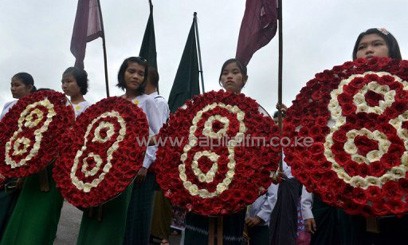
Students hold wreaths with the number eight, during a march to mark the 25th anniversary of the democratic uprising, also known also as “8888”, in Yangon on August 8, 2013/AFP
YANGON aUGUST 8- Myanmar activists Thursday held their first march through Yangon to mark the anniversary of a bloody crackdown on democracy rallies 25 years ago, in commemorations aimed at propelling reforms after the end of junta rule.
Hundreds of people watched some 50 campaigners march through downtown Yangon to recall one of the bloodiest incidents in the modern history of Myanmar, which has seen striking political changes since the end of outright military dictatorship two years ago.
“I think that we can now walk on the path to democracy because of the 1988 revolution. The transition is the consequence of that uprising,” said Tun Tun Oo, a 49 year old businessman who was a student protester involved in the 1988 rallies.
Marchers, who did not have official permission to walk through the streets, refused to halt when the head of police in the area asked them to stop. Police allowed them to continue, standing aside but taking pictures of those involved.
“I don’t think we need to get permission… We do not want to protest, we just want to express our respect. We are just walking,” Tun Tun Oo told AFP.
A vicious military assault on student led demonstrations against Myanmar’s military rulers on August 8, 1988 in the then capital Yangon sparked a huge popular uprising against the junta.
Hundreds of thousands of people took to the streets in the country calling for democracy, in protests that came to a brutal end the following month with an army crackdown that killed more than 3,000.
Myanmar has undergone sweeping political changes since a quasi civilian regime replaced junta rule in 2011.
Reforms have included freeing hundreds of political prisoners many of whom were jailed for their roles in the 1988 rallies and welcoming democracy champion Aung San Suu Kyi and her party into parliament.
The Nobel laureate, who is taking part in Thursday’s commemorations, rose to prominence during the protests.
She had been living in London but returned to Yangon in 1988 to nurse her sick mother, and was quick to take on a leading role in the pro democracy movement, delivering speeches to the masses at the city’s Shwedagon Pagoda.
Earlier Thursday, activists laid wreaths at Sule Pagoda in the centre of Yangon which was at the heart of the August 8 crackdown.
Win Min, a former student protester, said the scene in the area 25 years ago was “the worst and most unforgettable of my life”.
“We want to show our sorrow for the dead today and to show them we are moving forward to the goal of democracy… We promised them we would continue,” he told AFP.









































